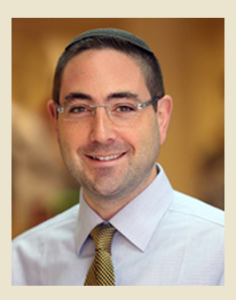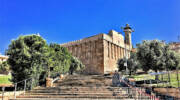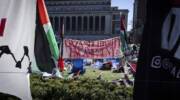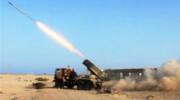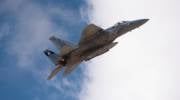There is a unique, beautiful and delicious end-of-Passover tradition observed by Moroccan Jewry, which has recently become a national celebration in Israel.
Mimouna is the post-Passover celebration of friendship, brotherhood, and unity that is observed in Moroccan Jewish communities. It is a 24-hour celebration which begins immediately with the conclusion of Passover. It is viewed by many as the formal return to chametz (leavened bread) after such foods were forbidden over the course of the holiday. The theme is good fortune, fertility, wealth and prosperity. To this effect, gold and jewelry often decorate the table, and sometimes they even decorate the food as well.
While the primary traditional food of Mimouna is certainly the moufletta, a type of pancake closely resembling the mallawach, there are others as well. Fruits, especially oranges, apples, almonds, and nut are eaten. Zaben (white almond nougat) marozia (fried raisins with nuts) and mazun (fruit jam) also feature prominently. Plates of flour decorate the table, which is often topped with gold coins, oil or beans. Live fish are often seen at Mimouna celebrations due to their association with protection and fertility.
There are a number of theories as to the origins of the name “Mimouna” with an emphasis on a continuation of Passover themes. First, there are those who suggest that the celebrations commemorate and are named in honor of Maimonides’ father, Rabbi Maimon ben Yosef, who is believed to have been born and/or died on this day. Maimon was an important figure in Moroccan Jewish life, having written and worked extensively on Muslim-Jewish relations. Indeed, largely due to his influence, Muslims often joined the Mimouna celebrations of their Jewish neighbors, even supplying the flour used to make the mouflettot, as many Jews did not keep flour in their homes over Pesach and therefore had none in their possession at the conclusion of the holiday.
Others say that the name is derived from the Arabic word for “wealth” and “good luck” or from the Hebrew word emuna or ma’amin – both of which mean “faith” or “belief”, which reflect Mimouna as a celebration of faith and trust in God. This is closely related to Passover in general and the crossing of the Red-Sea in particular, which took place on the last (seventh) day of Passover. It was at the crossing of the Red Sea that the entire nation witnessed the awesome power and might of God which was an experience that strengthened their emuna (faith).
The Midrashim (ancient sacred texts) also teach that following the drowning of the Egyptian pursuers, their gold and jewelry washed up to the shore and was made available for the taking, thereby enriching the Jews, hence the theme of wealth. So too, just as the Exodus from Egypt was the fulfillment of a promised redemption, Mimouna also symbolizes hope for the future redemption with the coming of the Messiah, a cornerstone of the Jewish faith. The word may also be related to manna, which was the food which God provided the Jewish people following the Exodus from Egypt and the subsequent wandering in the desert.
In the Morocco of yesteryear, Mimouna had a prominent place in the synagogue, which is no longer the case in most communities. On the afternoon of the last day of Passover, the congregation would take to the fields to recite the Birkat Ilanot – blessing over fruit trees. Following the conclusion of Passover, a number of readings were conducted from the Scriptures, especially from the book of Proverbs as well as the Mishna (oldest authoritative post-biblical collection and codification of Jewish oral law), which formally inaugurated the Mimouna celebrations.
In Israel, Mimouna is a national holiday observed with barbeques in the parks and family visits. It is interesting to note that it is a relatively new holiday, having only emerged in the middle of the 18th century.
Rabbi Ari Enkin is the rabbinic director of United with Israel.


Do You Love Israel? Make a Donation - Show Your Support!
Donate to vital charities that help protect Israeli citizens and inspire millions around the world to support Israel too!
Now more than ever, Israel needs your help to fight and win the war -- including on the battlefield of public opinion.
Antisemitism, anti-Israel bias and boycotts are out of control. Israel's enemies are inciting terror and violence against innocent Israelis and Jews around the world. Help us fight back!
